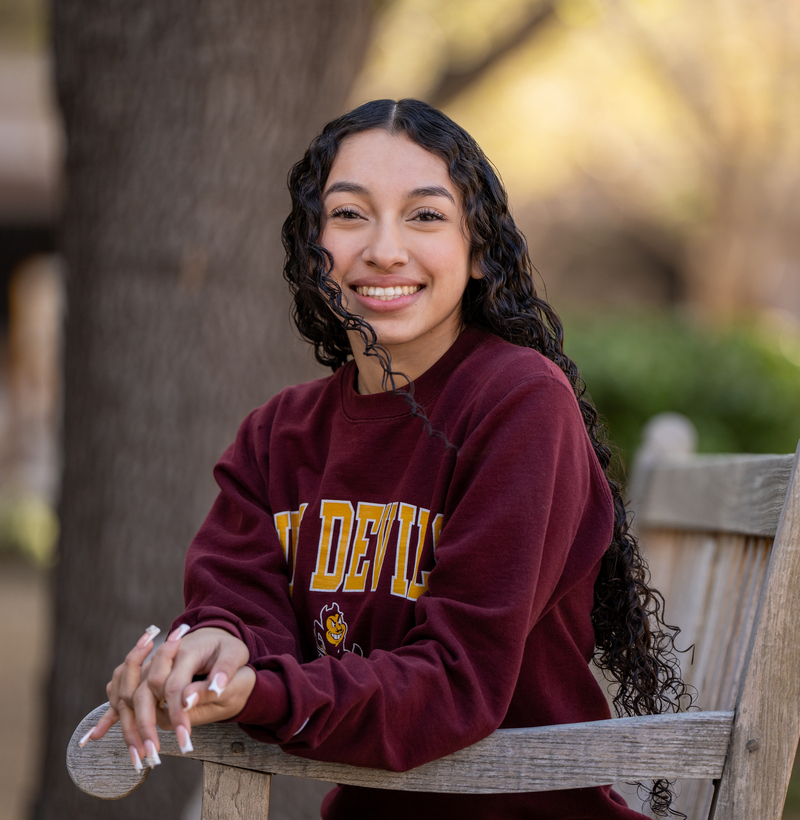
>> Business Student Stories
Thriving as a first-generation student : An interview with Cindy Rios

Cindy Rios
First-generation student and lifelong Arizona resident Cindy Rios (BA Health Care '24) combined a passion for the field of healthcare with a knack for math and analytics to choose her undergraduate business degree in health care.
Finding the right program fit also allowed Rios to find a supportive community of faculty and classmates at ASU's West Valley campus, whether in her classes, her on-campus jobs, or the student organizations she's a part of.
"I think something that's very special about the West Valley campus is the community feeling it has. The classes are very small,” she says. “Many professors know me by name, which I really appreciate. I want to have that connection.”
“I also like that within such a small class, you’re able to get to know your classmates,” she adds. The W. P. Carey School interviewed Rios about her ASU journey, what studying at the West Valley campus is like, and how she’s learned to thrive as a first-generation college student.
Q&A with Cindy Rios
Discover what it’s really like to be an undergraduate student at ASU’s W. P. Carey School of Business, Where Business is Personal.® This conversation with Cindy Rios has been edited and condensed.
Question: How did you choose your major, and what do you like most about it?
Answer: Growing up, I knew that being in the medical field was something I wanted. I grew up watching all the seasons of Grey's Anatomy. But when it came down to it, I couldn't really see myself being a doctor or a nurse. I've always been good at math and liked the analytical side of things. So I thought, "business health care, the best of both worlds." I could take business classes and healthcare delivery classes. I really like that it gives me a combination of both. I'm able to take all of the supply chain management and finance courses, while also learning about the different healthcare systems, learn about the financial side, the economics of healthcare, and things like that.
Q: How have you been able to apply coursework to the real world?
A: I've been able to apply my coursework to the real world through different jobs that I've had on campus. One of the main classes you take as a first-year student at W. P. Carey is CIS 105, and it's one of the classes that revolves around Excel and data, as well as statistics. That's a class that was very useful for me, especially during my time at the Sun Devil Fitness Complex (SDFC). I worked in the business department, and there were times I had to run different numbers to see if the budgeting was correct. Those classes really came into play, and they're very helpful.
Q: What has your experience been like working on campus?
A: Working on campus has really helped me in the real world and with future job experiences. It's helped me become more outgoing. I'm more extroverted because of it, and it's allowed me to meet a variety of different people. I've worked two different jobs on campus. I was a business manager at the SDFC, and now I am an office aide at the W. P. Carey Advising Office. I've been able to do different tasks, and it's interesting how the two jobs are very different, but they will ultimately help me with my future career.
Q: What's something special about the West Valley campus that you think is important for future students to know about?
A: I think something that's very special about the West Valley campus is the community feeling it has. The classes are very small. A lot of people say it's like high school, but I personally love being able to get to know my professors. I love that I can go up to them and have a conversation with them, and they'll know who I am. There's many professors that know me by name, which I really appreciate. I want to have that connection.
I also like that within such a small class, you're able to get to know your classmates. Within W. P. Carey, we take a lot of the same core classes, so there's students that you could see in your freshman year that you'll still have classes with in your junior year. I really like that, because I get to know my classmates. I can reach out to them if I missed a class, or if I don't understand some type of information, and they're there. I like that everyone here is a community, and everyone's nice. It's very calm.
Q: Tell us about your campus involvement. How did you find the organization you're a part of?
A: I am currently involved with the Programming Activities Board, also known as PAB, here at the West Valley campus. I'm a live entertainment intern, and I've been with them for about two and a half years. I started my journey with them the second semester of my freshman year. It's been amazing. I've been able to get to know a lot of different people. There's individuals who just joined this and some who joined with me when I first started, and I've gotten to meet a variety of different people. Everyone has a different perspective, so when it comes to planning events, it's just amazing what we come up with.
The way I got involved was actually through a friend that I had in high school. She told me, "Hey, you should join our intramural volleyball team," and I said, "Okay." Then it turned out that all the members of that team were actually a part of PAB, and they told me it'd be great if I joined. Before that, I didn't know what PAB was. But when you're a business student, you have to take WPC 101, and one of the requirements is to attend events. I remember going to one of the PAB events, and I thought it was really cool and wanted to join. At that moment, they were filled, so I had to wait until the next semester.
Q: What does it mean to you to be a first-generation college student?
A: It means a lot. It's very hard. Being a first-gen student in college, you're going to be faced with impostor syndrome. It's something that everyone goes through. You don't feel like you belong. You've never been through this. You're going to feel like you can't talk to people, because obviously being first generation, your parents might not understand, and your siblings might not understand. But it's something you have to push through. I feel like there's also beauty in being a first-generation student. You build resilience. There's always a light at the end of the tunnel, and once you realize it's a privilege to be here, I feel like you really start to take your studies seriously, and you really start to look forward to the future after graduation.
Q: What are you looking forward to after you graduate?
A: After I graduate, I'm really looking forward to landing a job. I'm very interested in working within the healthcare field, so I want to try to find a job at a children's hospital, like Phoenix Children's. I want to be able to make a change even without providing hands-on service. I would like to work with the executives to make sure that everything's running well. I've also been very interested in medical devices, working with Pfizer, and other things like that. So that's also an option I can keep open. Another thing that I have in mind is I want to eventually return to school and get a master's degree in healthcare delivery.
Q: What advice do you have for future W. P. Carey students?
A: Definitely explore all the different majors. I wouldn't have thought that there were so many, but we have tons and tons of majors, some that are here at the West Valley campus that aren't available at Tempe. It's amazing that there's so many across the board, and something that you might not even think is a major is one, and that's the great thing about it. My major in particular is not really well known, but I really enjoy studying it.
Another piece of advice that I would give is to really become involved with things that have to do with W. P. Carey. A lot of the events that happen, as well as the job fairs, are in Tempe, so I would say go out there. It's only a shuttle away. I wish that's something I would have done more. I didn't really go to Tempe much. I usually just stayed at the West Valley campus, and that's now something that I'm starting to do.
I would say just reach out. Go to the W. P. Carey career fairs. If you're a Hispanic student, go to the Hispanic Business Students Association (HBSA). There's different opportunities there. There's also the Women in Business Association. There's a ton of different clubs that you can join as a W. P. Carey student. Just reach out to those clubs and get yourself involved.
Connect with W. P. Carey
Request information
about ASU business programs
Make an admission appointment
or schedule a campus visit
Talk to a student leader
Business Ambassadors are on every campus
Access information
for current students